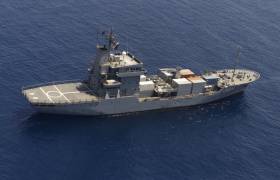Displaying items by tag: NATO fleet Dublin
NATO Naval Minehunter Flotilla Dock in Dublin Port
#NATOdublin - In this historic week of the Easter Monday 1916 Rising Centenary and backdrop of World War I, a flotilla of NATO vessels among them from the UK and Germany docked in Dublin Port this morning, writes Jehan Ashmore.
The North Atlantic Treaty Organisation (in which Ireland is not a member) naval exercise group is on a four-day visit to the capital.
Of the six-strong Standing NATO Mine Counter Measures Group 1, the UK is represented by the Royal Navy Sandown-class minehunter HMS Ramsey, usually based in Faslane.
Earlier this year the minehunter transited the 98-kilometre Kiel canal. It was at Kiel that the sailors attended a ceremony which saw the German Navy and Commander Martin Schwarz of flagship FGS Donau take charge of the minehunter group – one of two operated by NATO in European waters.
FGS Donau is an 'Elbe' class auxiliary and supplies vessel which led the NATO fleet into Dublin Bay last night to anchor. The 3,500dwt tonnes replenishment vessel was joined by fleetmate minehunter FGS Dillingen.
According to ‘The Sea and The Easter Rising’ by the late Dr. John de Courcy Ireland, it was during 1914 that the Germans captured the Norwegian owned, Wilson Liner freighter Castro. The cargoship was converted into a naval auxiliary cruiser as the S.M.S. Libau (pseudo S.S. Aud) for her arms shipment role from Lubeck to its scuttling off the Daunt Rock.
The other NATO navies vessels are Vlaardingen (Netherlands) Primula (Belgium) and Otra from Norway. They are also berthed in Dublin Port with their German counterparts near the East Link Bridge at the North Quay Wall Extension.
It is the task of NATO fleet to practise minehunting collectively so they can respond to any crisis as well as to conduct exercises dealing with historic ordnance such as bombs, unexploded torpedoes, shells and mines from the two World Wars.
The Mine warfare operations of NATO’s Alliance Strategy is to provide a crucial contribution to each and to take an integral and vital role in all maritime and joint operations.



























































